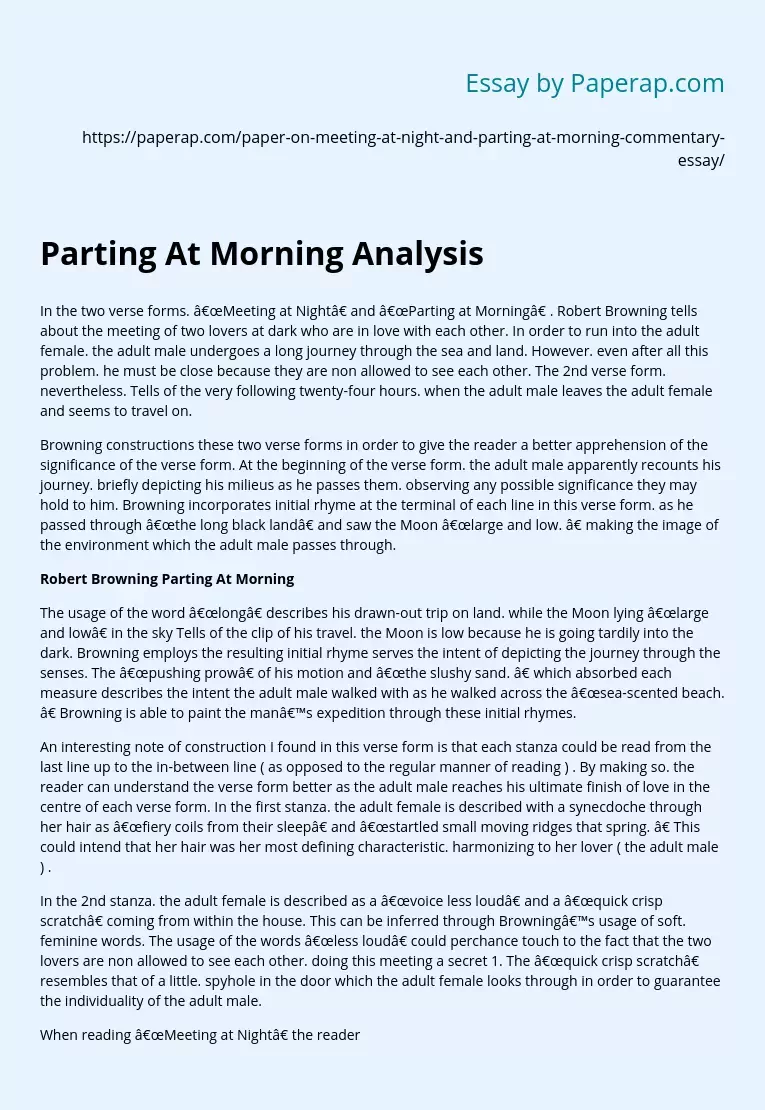Parting At Morning Analysis
In the two verse forms. “Meeting at Night” and “Parting at Morning” . Robert Browning tells about the meeting of two lovers at dark who are in love with each other. In order to run into the adult female. the adult male undergoes a long journey through the sea and land. However. even after all this problem. he must be close because they are non allowed to see each other. The 2nd verse form. nevertheless. Tells of the very following twenty-four hours.
when the adult male leaves the adult female and seems to travel on.
Browning constructions these two verse forms in order to give the reader a better apprehension of the significance of the verse form. At the beginning of the verse form. the adult male apparently recounts his journey. briefly depicting his milieus as he passes them. observing any possible significance they may hold to him. Browning incorporates initial rhyme at the terminal of each line in this verse form.
as he passed through “the long black land” and saw the Moon “large and low. ” making the image of the environment which the adult male passes through.
Robert Browning Parting At Morning
The usage of the word “long” describes his drawn-out trip on land. while the Moon lying “large and low” in the sky Tells of the clip of his travel. the Moon is low because he is going tardily into the dark. Browning employs the resulting initial rhyme serves the intent of depicting the journey through the senses. The “pushing prow” of his motion and “the slushy sand.
” which absorbed each measure describes the intent the adult male walked with as he walked across the “sea-scented beach. ” Browning is able to paint the man’s expedition through these initial rhymes.
An interesting note of construction I found in this verse form is that each stanza could be read from the last line up to the in-between line ( as opposed to the regular manner of reading ) . By making so. the reader can understand the verse form better as the adult male reaches his ultimate finish of love in the centre of each verse form. In the first stanza. the adult female is described with a synecdoche through her hair as “fiery coils from their sleep” and “startled small moving ridges that spring. ” This could intend that her hair was her most defining characteristic. harmonizing to her lover ( the adult male ) .
In the 2nd stanza. the adult female is described as a “voice less loud” and a “quick crisp scratch” coming from within the house. This can be inferred through Browning’s usage of soft. feminine words. The usage of the words “less loud” could perchance touch to the fact that the two lovers are non allowed to see each other. doing this meeting a secret 1. The “quick crisp scratch” resembles that of a little. spyhole in the door which the adult female looks through in order to guarantee the individuality of the adult male.
When reading “Meeting at Night” the reader must besides see the verse form “Parting at Morning” as they relate to one another. Although they can both be read individually. reading them together leaves the reader with a different apprehension. as “Parting at Morning” provides a different stoping. a different declaration to the two lover’s secret meeting. The usage of anaphora in this short. one stanza verse form indicates exhilaration in the adult male as he looks on to “a way of gold” taking to “a universe of men” as “the Sun looked over the mountain’s rim.
This could bespeak that the adult male was traveling frontward from his clip with the adult female and looking frontward to puting sail onto lands unknown. with the promise of gold. This is due to the fact that it was general sailor’s belief that adult females were bad fortune on ships. and therefore was by and large unwelcome. The words “cape. ” “sea. ” and “strait” evoke images of the sea. as they are all organic structures of H2O. and hence allude to the adult male being a crewman ( which wasn’t as specified in “Meeting at Night” ) .
Parting At Morning Analysis. (2019, Dec 05). Retrieved from https://paperap.com/paper-on-meeting-at-night-and-parting-at-morning-commentary-essay/

